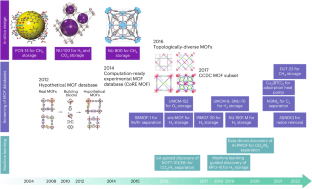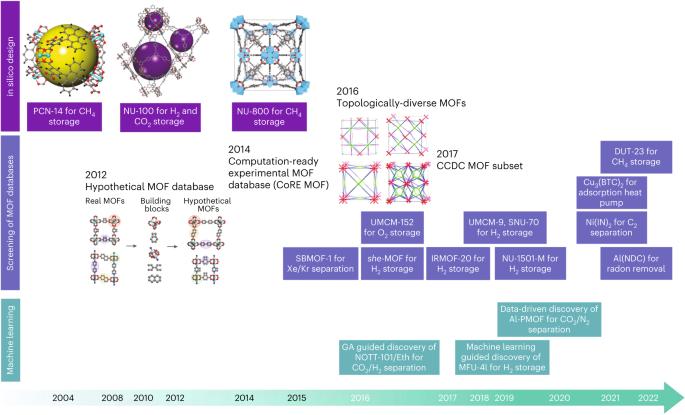Progress toward the computational discovery of new metal–organic framework adsorbents for energy applications
IF 60.1
1区 材料科学
Q1 ENERGY & FUELS
引用次数: 0
Abstract
Metal–organic frameworks (MOFs) are a class of nanoporous material precisely synthesized from molecular building blocks. MOFs could have a critical role in many energy technologies, including carbon capture, separations and storage of energy carriers. Molecular simulations can improve our molecular-level understanding of adsorption in MOFs, and it is now possible to use realistic models for these complicated materials and predict their adsorption properties in quantitative agreement with experiments. Here we review the predictive design and discovery of MOF adsorbents for the separation and storage of energy-relevant molecules, with a view to understanding whether we can reliably discover novel MOFs computationally prior to laboratory synthesis and characterization. We highlight in silico approaches that have discovered new adsorbents that were subsequently confirmed by experiments, and we discuss the roles of high-throughput computational screening and machine learning. We conclude that these tools are already accelerating the discovery of new applications for existing MOFs, and there are now several examples of new MOFs discovered by computational modelling. Metal–organic frameworks (MOFs) are porous materials that may find application in numerous energy settings, such as carbon capture and hydrogen-storage technologies. Here, the authors review predictive computational design and discovery of MOFs for separation and storage of energy-relevant gases.


计算发现能源应用领域新型金属有机框架吸附剂的进展
金属有机框架(MOFs)是一类由分子构件精确合成的纳米多孔材料。MOFs 可在许多能源技术中发挥关键作用,包括碳捕获、能源载体的分离和存储。分子模拟可以提高我们对 MOFs 吸附的分子级理解,现在有可能对这些复杂的材料使用现实的模型,并预测其吸附特性与实验结果的定量一致。在此,我们回顾了用于分离和储存能量相关分子的 MOF 吸附剂的预测性设计和发现,以期了解我们能否在实验室合成和表征之前通过计算可靠地发现新型 MOF。我们重点介绍了发现新型吸附剂的硅学方法,这些吸附剂随后得到了实验的证实,我们还讨论了高通量计算筛选和机器学习的作用。我们的结论是,这些工具已经在加速发现现有 MOFs 的新应用,目前已有多个通过计算建模发现新 MOFs 的实例。
本文章由计算机程序翻译,如有差异,请以英文原文为准。
求助全文
约1分钟内获得全文
求助全文
来源期刊

Nature Energy
Energy-Energy Engineering and Power Technology
CiteScore
75.10
自引率
1.10%
发文量
193
期刊介绍:
Nature Energy is a monthly, online-only journal committed to showcasing the most impactful research on energy, covering everything from its generation and distribution to the societal implications of energy technologies and policies.
With a focus on exploring all facets of the ongoing energy discourse, Nature Energy delves into topics such as energy generation, storage, distribution, management, and the societal impacts of energy technologies and policies. Emphasizing studies that push the boundaries of knowledge and contribute to the development of next-generation solutions, the journal serves as a platform for the exchange of ideas among stakeholders at the forefront of the energy sector.
Maintaining the hallmark standards of the Nature brand, Nature Energy boasts a dedicated team of professional editors, a rigorous peer-review process, meticulous copy-editing and production, rapid publication times, and editorial independence.
In addition to original research articles, Nature Energy also publishes a range of content types, including Comments, Perspectives, Reviews, News & Views, Features, and Correspondence, covering a diverse array of disciplines relevant to the field of energy.
 求助内容:
求助内容: 应助结果提醒方式:
应助结果提醒方式:


